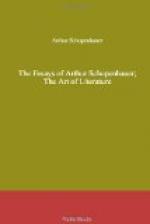A man’s works are the quintessence of his mind, and even though he may possess very great capacity, they will always be incomparably more valuable than his conversation. Nay, in all essential matters his works will not only make up for the lack of personal intercourse with him, but they will far surpass it in solid advantages. The writings even of a man of moderate genius may be edifying, worth reading and instructive, because they are his quintessence—the result and fruit of all his thought and study; whilst conversation with him may be unsatisfactory.
So it is that we can read books by men in whose company we find nothing to please, and that a high degree of culture leads us to seek entertainment almost wholly from books and not from men.
ON CRITICISM.
The following brief remarks on the critical faculty are chiefly intended to show that, for the most part, there is no such thing. It is a rara avis; almost as rare, indeed, as the phoenix, which appears only once in five hundred years.
When we speak of taste—an expression not chosen with any regard for it—we mean the discovery, or, it may be only the recognition, of what is right aesthetically, apart from the guidance of any rule; and this, either because no rule has as yet been extended to the matter in question, or else because, if existing, it is unknown to the artist, or the critic, as the case may be. Instead of taste, we might use the expression aesthetic sense, if this were not tautological.
The perceptive critical taste is, so to speak, the female analogue to the male quality of productive talent or genius. Not capable of begetting great work itself, it consists in a capacity of reception, that is to say, of recognizing as such what is right, fit, beautiful, or the reverse; in other words, of discriminating the good from the bad, of discovering and appreciating the one and condemning the other.
In appreciating a genius, criticism should not deal with the errors in his productions or with the poorer of his works, and then proceed to rate him low; it should attend only to the qualities in which he most excels. For in the sphere of intellect, as in other spheres, weakness and perversity cleave so firmly to human nature that even the most brilliant mind is not wholly and at all times free from them. Hence the great errors to be found even in the works of the greatest men; or as Horace puts it, quandoque bonus dormitat Homerus.
That which distinguishes genius, and should be the standard for judging it, is the height to which it is able to soar when it is in the proper mood and finds a fitting occasion—a height always out of the reach of ordinary talent. And, in like manner, it is a very dangerous thing to compare two great men of the same class; for instance, two great poets, or musicians, or philosophers, or artists;




